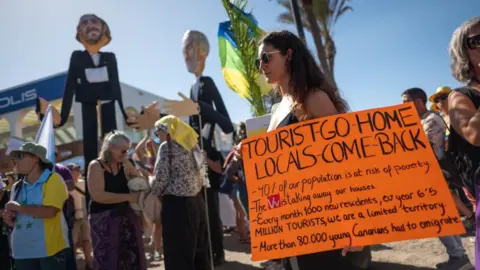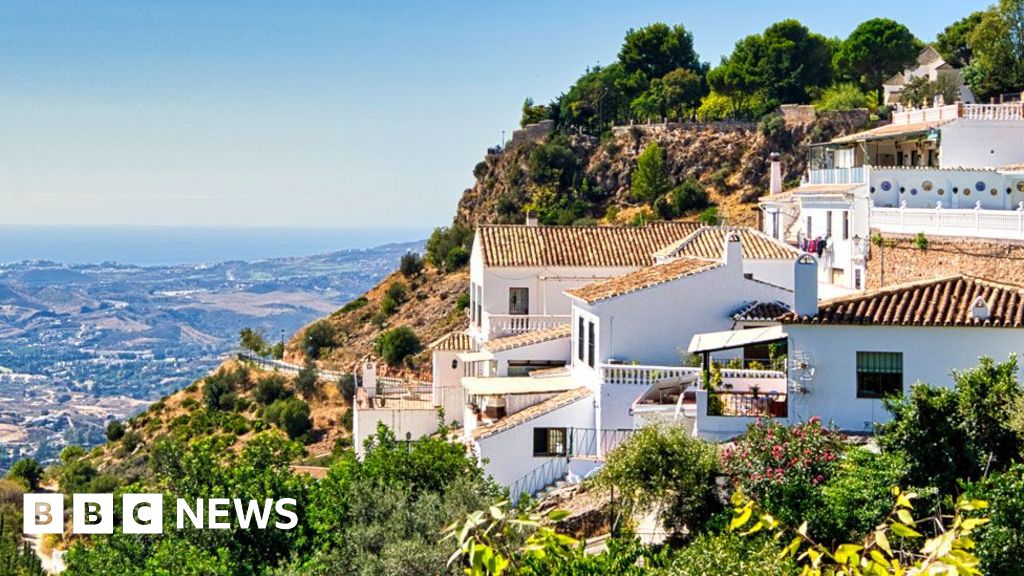 Getty Images
Getty ImagesSpain is planning to impose a tax of up to 100% on the value of properties bought by non-residents from countries outside the EU, such as the UK.
Announcing the move, Prime Minister Pedro Sánchez said the “unprecedented” measure was necessary to meet the country’s housing emergency.
“The West faces a decisive challenge: To not become a society divided into two classes, the rich landlords and poor tenants,” he said.
Non-EU residents bought 27,000 properties in Spain in 2023, he told an economic forum in Madrid, “not to live in” but “to make money from them”.
“Which, in the context of shortage that we are in, [we] obviously cannot allow,” he added.
The move was designed to prioritise available homes for residents, the Spanish prime minister said.
Sánchez did not provide any more details on how the tax would work nor a timeline for presenting it to parliament for approval, where he has often struggled to gather sufficient votes to pass legislation.
His office described the proposed measure as a way to limit the purchase of homes by “non-resident non-EU foreigners”. In Spain, people are classed as non-residents if they live in the country for less than 183 days in a single year.
It added: “The tax burden that they will have to pay in case of purchase will be increased up to 100% of the value of the property, in line with countries such as Denmark and Canada.”
The Spanish government said the proposal would be finalised “after careful study”.
The total number of sales to foreigners, including people from inside the EU, makes up around 15% of the Spanish housing market – that’s 87,000 out of 583,000 sales in 2023 – according to the Spanish property registry.
 Getty Images
Getty Images‘Extreme proposal’
Simon Creed of Azahar Properties, who has been selling homes in the Valencia region to Britons, Americans and other non-EU citizens for over 22 years, said the proposal had been the talk of property professionals in the area.
Currently buyers in Valencia, non-residents and Spanish citizens alike, pay 10% transfer tax on the property’s value. This figure varies with region.
“Naturally who wants to pay 100% purchase tax for buying a property here,” he told BBC News.
“The Brits have always been big buyers here in Spain, but obviously it is going to increase the buying power of EU citizens like the German, French and Belgians, so it doesn’t appear to be very fair just to isolate non-EU buyers.”
He added: “Something needs to happen to increase the amount of houses coming onto the market, but this is an extreme proposal.”
Antonio de la Fuente, managing director at Colliers International Spain, told BBC World Business Report he did not think 100% tax would solve the housing problem.
“We all agree we are in a problem of not enough supply and we need to produce new supply to give people migrating from other parts of Spain to big cities like Madrid, Valencia, [and] Malaga a new home.
“But this will be a drop in the ocean in my opinion and there will be other alternatives that will have a higher impact on the housing market.”
 Getty Images
Getty Images‘I’ll be looking at Cyprus instead’
Prospective British buyers told BBC News the proposal had made them think again about buying in Spain.
Michele Hayes, from Manchester, who spent the weekend house-hunting south of Alicante, had wanted a property for family to visit and to spend time during her retirement.
“We could look at buying quickly before the tax comes in, but we don’t know what could happen in the future,” she said.
“Selling could be tough if we can no longer sell to non-residents, especially a holiday home property in a touristy area.”
The 59-year-old said she empathised with their housing issue, but said she wanted to add to the local economy and asked: “How many working Spanish people want to live in holiday homes in these tourist areas anyway?”
Martin Craven, from London, said he had been looking to buy in Spain this year.
“I definitely wouldn’t consider trying to get in before this tax, because who knows what else they could do, a retrospective tax or a tax on existing owners,” the 62-year-old said.
“I’ll be looking at Cyprus now instead.”
Julian, 54, from Surrey, said Spain was his first choice to buy a holiday home, but now it “looks more risky” than other countries.
“I would want to be out there four to six months a year, also travelling, spending money, buying food and drink, paying taxes,” the 54-year-old said.
“Here in the UK, we also have problems with landlords buying multiple properties and driving up the rest, but this policy is losing sight of those of us who want to spend money in the country. “
It is one of a dozen planned measures announced by the Spanish prime minister on Monday aimed at improving housing affordability in the country.
Other measures announced include a tax exemption for landlords who provide affordable housing, transferring more than 3,000 homes to a new public housing body, and tighter regulation and higher taxes on tourist flats.
“It isn’t fair that those who have three, four or five apartments as short-term rentals pay less tax than hotels,” Sánchez said.

